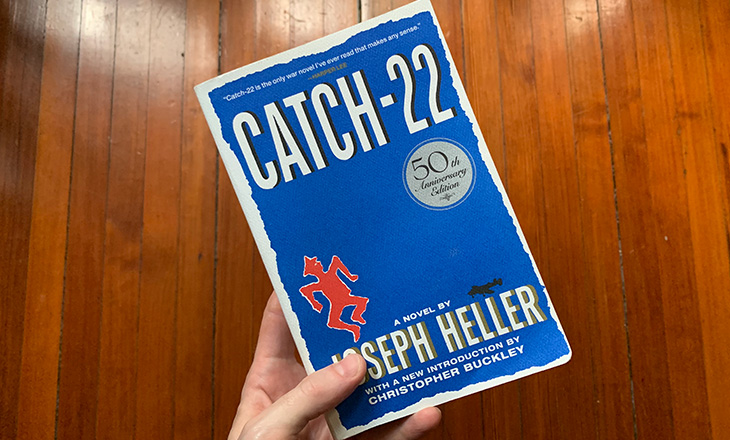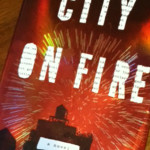I finally finished Catch-22 after a thoroughly unenjoyable month-long slog through the book.
I tried to read it years ago. It’s a classic novel and it was perpetually on the paperback favorites table in every Barnes and Noble I went in to and if that’s not the highest praise a novel can receive, I don’t know what is.
But I just couldn’t get into it. I put it down after a few chapters and just felt no motivation to pick it back up again.
Then recently, I saw that there was a Hulu series based on the book starring George Clooney and Christopher Abbott. Clooney knows what he’s doing. If I’m going to watch that, I might as well give the novel a shot again. So, I ordered it from Amazon. And, hell, once I finish, I can watch the Mike Nichols movie with Alan Arkin.*
*The film version of the movie has notoriously been overshadowed by its much more successful contemporary, Robert Altman’s M*A*S*H. Catch-22 the movie also inspired the Simon and Garfunkel song “The Only Living Boy in New York” about Garfunkel getting a part in the film and Paul Simon getting fired and left back in New York. That was a wise move on Nichols’s part as anyone who has watched Simon’s atrocious performance in Annie Hall can attest.
There are a few things that you should know about me regarding books.
1. I make it a point to finish every book I start.
Clearly I adopted this policy after I put Catch-22 down the first time. I noticed that I just kept buying and accumulating books, more and more of which were unfinished and just sitting on my bookshelves. So, if you’re wondering why I didn’t just stop reading, that’s the reason.
2. I get really, obsessively frustrated when I don’t understand what makes a book great.
This applies to comedy, film, and music too. The last time I remember this frustrating feeling of “what the hell is this?” it was with Rachel Kushner’s The Flamethrowers. She had been hailed as a new, important writer but I couldn’t for the life of me figure out what the hell her book was about. It was about the art scene in New York in the sixties or seventies and Italian tires and motorcycles. I think. I kept telling my girlfriend at the time, “This is really interesting, you should read it,” then five minutes later, “I have no idea what this is.”
I don’t like not understanding a book. Whenever I get the urge to dismiss something, I feel like a tenth grader saying, “Why don’t Shakespearean characters talk normal?” I always think there must be some deeper brilliance if only I had the mental capacity to understand it or unpack it.
I asked friends if they had read Catch-22 or enjoyed it. My friend Erin said she did and gave me the advice to not get caught up in all the details of all of the characters – there are, like, forty main characters – just go with the comedic chaos of it all.
That was good advice and for a few pages I thought to myself, “Yeah, I can see how this approach works.” Then a few pages later I’d think, “Oh for Christ’s sake, what is this?”
3. I can get really tripped up by even the smallest turn of phrase that doesn’t make sense to me.
I’m going to assume that this one is particular to me. Strange language can trip me up like one misplaced character in the code of a computer program can cause the program to shut down.
I clearly remember a particular instance of this happening. I was in high school. I was reading The Sea Wolf by Jack London. Page one, paragraph two begins, “Not but that I was afloat in a safe craft…”
“Not but that I was afloat…”?
“Not but that…”
What? Not but that? What does that mean? I asked my parents. They couldn’t give me a satisfactory answer and I could barely continue the book until I had one.
Not but that. Not but that? What?
The exact same thing happened when I got to the chapter in Catch-22 where Orr said he wanted “apple cheeks.” That’s when I put the book down the first time all those years ago.
Apple cheeks? What the fuck are apple cheeks? He put crab apples in his cheeks – one in each cheek – to give himself apple cheeks. Isn’t an adult WWII veteran the author of this book? What the hell is this?
I have a similar problem with the first two sentences of the book. “It was love at first sight. The first time Yossarian saw the chaplain he fell madly in love with him.” It’s a cool opening but, unless I missed something, Yossarian wasn’t in love with the chaplain. There was no mention of Yossarian being gay or having any affection for the chaplain throughout the rest of the book. So, what’s with that opening? What am I missing? Why doesn’t Romeo say, “I dig you, Juliet”? How does she even understand him anyway?
Look, I get that it’s about the absurdity of war and the incompetence of leadership and war profiteering. It’s written with an absurdly comic – almost vaudevillian or Marx Brothers-ish – tone to reflect the absurdity. Fine. Did the absurdity, and frankly the stupidity, have to go on for 450 pages? 200 would have been fine. 150, even.
There’s a nightmarish walk that Yossarian takes through the streets of Rome at night that was really compelling, as was the reveal of the events of Snowden’s death. But stuff like that was sprinkled far too sparsely throughout the book.
In further attempts to understand what I don’t understand about the book, I read the supplemental materials that came along at the end of the novel. Apparently not everyone loved this book. It achieved cult status during the Vietnam era, much like another WWII book by a veteran, Vonnegut’s Slaughterhouse Five. (I really enjoyed that book by the way.) Even one of the higher ups at Simon and Schuster found Catch-22 boring and repetitive.
That’s all I needed to hear to feel like I wasn’t alone: that someone else who knows books also thought this book wasn’t that great.
So, up on the shelf it goes. The irony is now that I’ve finished it, I have no desire to see the miniseries or the movie. (And no, that’s not a catch-22, it’s just ironic.)




